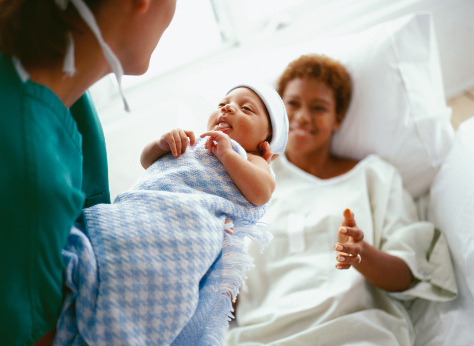Differences between a first and second birth
Now you are pregnant for the second time, it is natural to have questions and concerns. Check out our guide for information, advice and useful facts

Now you are pregnant for the second time, it is natural to have questions and concerns regarding experiencing childbirth again. Although it can feel like a daunting prospect now, it is most likely that this feeling was much greater before your first birth. Although there is likely to be some minor differences to the first time around, you can feel confident in knowing it is more likely to be marginally quicker and less painful. For more general information and advice surrounding the birthing process, head over to our birth section.
Differences in labour
The second time around, you may find your baby’s head engages in your pelvis later on than it did during your first pregnancy. It is not uncommon for this engagement not to happen at all until you enter labour, when the contractions cause the pushing of your baby downwards towards your pelvic area.
It is also likely that your contractions may come on stronger, and more quickly this time around as well as your cervix opening faster too. Generally speaking unless you had a caesarean, it will probably be easier for your baby’s head to pass through the birth canal. This is as a result of your pelvic floor muscles and the elastic walls of your vigana have been previousely stretched during the first birth.
The good news is that the duration of your labour will most likely be shorter the second time. For first time mothers, the active first stage of labour (when the cervix dilates from 4 cm to 10cm) normally lasts an average of eight hours, and is unlikely to last longer than 18 hours. However, for second time birthers, this average is five hours, and is unlikely to last longer than 12 hours. Also it is worth noting that your ‘pushing stage’ is likely to last less than two hours, compared with three hours of first time mums.
Be sure to check out our dedicated labour section for advice, information and tips surrounding labour.
Where to have your next baby
Provided you are healthy and your pregnancy is going well and your first birth was straightforward, you should be able to choose where you give birth this time around. Many mothers choose to have the second birth in a home environment, as it can seem less daunting. First time births are recommended to happen in a hospital, as this is the safest option for the baby, however if you have given birth before without issues then a home birth is just as safe.
If you did have any complications the first time around or have any medical conditions, then it is recommended to give birth in a medical environment again (such as birth centre or hospital).
Caesareans
If you had a c-section with your first child, but are keen to have a vaginal birth this time around then the odds on your side. This is even moreso the case if the reason you had a caesarean was specific to your last birth, such as if your baby was breech or you had pre-eclampsia. Provided your pregnancy is all going well this time, your obstetrician is likely to support you in your choice to plan for a vaginal birth. Roughly three out of four mothers who have had a c-section go on to have a vaginal birth afterwards.
For more information regarding c-sections, be sure to read our guide or advice before and after.
Bigger baby?
Statistically speaking, it is likely your second baby will be bigger than your first, however this is not always the case. If your first birth was a large baby weighing 10lb or more, you are more likely to have a large baby this time too. It is worth noting that on average, second babies are only around 5 oz (or 140g) heavier.
Early arrival again?
If you have previously had a premature baby, this does not mean that your next baby will also be premature, however it is statistically slightly more likely. There is around a 20% chance that your second child will be premature. Even with all factors being the same, remember that every birth is different though so it is hard to draw any real conclusions from previous experiences.